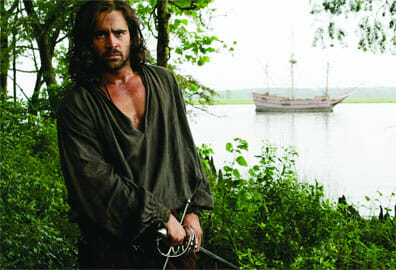Movies about difficult decisions fascinate me. The Son. Late Spring. Kieslowski’s Decalogue. Of course, it’s always easier for a storyteller to wall off certain paths so that characters march toward a prescribed outcome. Whether it’s the lack of African characters in The Constant Gardener’s story about Africa or the overly telegraphed tragedy of Brokeback Mountain, contrivances designed to flatter and manipulate the audience are a sleight-of-hand trick used by filmmakers who seem more interested in riding a wave of public discussion than contributing to it. Their situations arise out of a need for tears rather than the other way around.
The typical weepy recoils from decisions, but The New World couldn’t be more different. Inside its framework of American folklore are a thousand questions about paths. The opening credits appear over a map that’s rivers are gradually being traced. Repeatedly characters find themselves rerouted, redirected or offered a new name or new life. At one point, John Smith (Colin Farrell) is asked to explore the New World’s rivers to find a passage to the Indies. “You’re not the sort of man who begins a path and doesn’t pursue it, are you?” someone asks, but the man asking the question doesn’t realize that—if Smith accepts the offer—he’ll be abandoning the path he’s begun with Pocahontas. Later she’ll ask him, “Did you ever find your Indies, John?” and his response is the film’s most memorable line.
Terrence Malick risks his entire story to make us feel his characters’ uncertainty. Having established the movie’s Plan A, he drops it, and the movie is suddenly adrift, wallowing in pity for unrequited love. Eventually a Plan B emerges, but as a viewer I resisted it, and so does Pocahontas. Surely Plan A can be salvaged! But Malick, determined to leave it behind, changes the identity of his main character and asks us to begin again, from scratch, this time pairing her with Christian Bale. The landscape changes—from grass tall as men to rows of dirt on homesteads—and later it changes again to manicured royal lawns as different from the Virginia woods as “Rebecca” is from “Pocahontas,” as girdles are from buckskin patches.
Having steered his movie through a sharp left turn Malick gradually regains some momentum, but then he does the unthinkable: he leads us to believe that Plan A may be viable after all, that John Smith may return, and that idyllic life in the woods may yet become a reality.
Except for one problem: what do we do about Mr. Bale? It’s the sort of dilemma that could have been played to the tragic hilt—and Malick raises the possibility as Smith rides back into the film on horseback—but such a simple, bankrupt conclusion isn’t his way. His characters must consider their lives, consider each other and resolve the situation like adults. And when they do, the story that seemed so irredeemably broken snaps back together, and Pocahontas finds her future, running through a maze of hedges.
It’s indeed a movie about new worlds—chosen worlds—and life’s left turns. And it’s one of the boldest movies to come out of Hollywood in a long time, not because it flirts with controversy but because it asks patience of its audience and sacrifices dramatic conventions to explore a greater truth.
